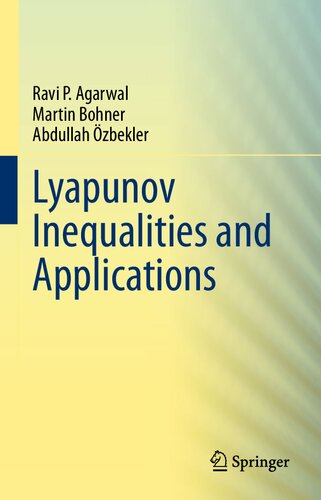

Most ebook files are in PDF format, so you can easily read them using various software such as Foxit Reader or directly on the Google Chrome browser.
Some ebook files are released by publishers in other formats such as .awz, .mobi, .epub, .fb2, etc. You may need to install specific software to read these formats on mobile/PC, such as Calibre.
Please read the tutorial at this link: https://ebookbell.com/faq
We offer FREE conversion to the popular formats you request; however, this may take some time. Therefore, right after payment, please email us, and we will try to provide the service as quickly as possible.
For some exceptional file formats or broken links (if any), please refrain from opening any disputes. Instead, email us first, and we will try to assist within a maximum of 6 hours.
EbookBell Team

4.1
90 reviewsThis book provides an extensive survey on Lyapunov-type inequalities. It summarizes and puts order into a vast literature available on the subject, and sketches recent developments in this topic. In an elegant and didactic way, this work presents the concepts underlying Lyapunov-type inequalities, covering how they developed and what kind of problems they address.
This survey starts by introducing basic applications of Lyapunov’s inequalities. It then advances towards even-order, odd-order, and higher-order boundary value problems; Lyapunov and Hartman-type inequalities; systems of linear, nonlinear, and quasi-linear differential equations; recent developments in Lyapunov-type inequalities; partial differential equations; linear difference equations; and Lyapunov-type inequalities for linear, half-linear, and nonlinear dynamic equations on time scales, as well as linear Hamiltonian dynamic systems.
Senior undergraduate students and graduate students of mathematics, engineering, and science will benefit most from this book, as well as researchers in the areas of ordinary differential equations, partial differential equations, difference equations, and dynamic equations. Some background in calculus, ordinary and partial differential equations, and difference equations is recommended for full enjoyment of the content.